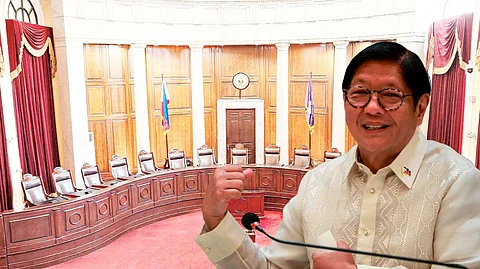
- NEWS
- the EDIT
- COMMENTARY
- BUSINESS
- LIFE
- SHOW
- ACTION
- GLOBAL GOALS
- SNAPS
- DYARYO TIRADA
- MORE

BENGALURU, India — For President Ferdinand Marcos Jr., the Supreme Court has issued a decision on the impeachment case that must be respected. Still, he stressed that accountability remains to be settled.
The decision to halt the impeachment complaint against Vice President Sara Duterte highlighted the flaws in the handling of the case by the House of Representatives and the Senate.
In a 13-0-2 decision, the Tribunal ruled that the articles of impeachment and the process undertaken went against the Constitution.
“The Supreme Court has decided, and like I’ve said, that’s it,” the President said.
“Let me clarify. The Supreme Court did not examine the merits of the case. This does not mean that it decides the merits of the case. It just talked about the procedure. So, the procedure was faulty; it lacked something. So that’s the assessment of the Supreme Court. It has no bearing on the rightness or wrongness of the impeachment,” Marcos said at a Kapihan with the Media in Bengaluru, India on Friday.
“What the Supreme Court said, the handling of the House, your handling of the impeachment complaint, is not right. That’s all,” he said.
The President reiterated that the executive branch has no role in the impeachment of Vice President Sara Duterte.
“The President has no role. I’m an impeachable officer. I cannot involve myself in any of this. It’s the Supreme Court, the Senate, and the House. That’s where the decisions were made on the issues between the House, the Senate, and the Supreme Court,” he said.
Mechanisms remain in place to investigate corruption, Marcos said, when asked to comment on the corruption allegations against the Vice President.
CoA must check
“You know, we already have the CoA (Commission on Audit), we already have all of this. I’m sure the House and the Senate will start to conduct further investigations on this because it’s really within their purview. So we have all of the mechanisms that are available to us in terms of checks and balances. All we have to do is to try and get some answers,” he said.
The President emphasized that the High Court’s decision only considered the procedure that was conducted.
“We have to make very clear to everyone that the Supreme Court decision does not have any bearing on the rightness or wrongness of the merits of the impeachment case. They’re not saying that there was wrongdoing,” he said. “Neither are they saying that there was no wrongdoing. All they’re saying is that you did not handle it properly. That’s it,” Marcos said.
Not playing safe--Lacson
Meanwhile, Senator Panfilo M. Lacson pushed back against insinuations that he was “playing it safe” when he abstained from voting on the motion to archive the impeachment complaint against Duterte.
In a television interview, Lacson emphasized that his abstention was not a political maneuver but a deliberate decision grounded on legal principle and respect for the Supreme Court’s authority.
“I did not ‘play safe.’ Rather, I acted out of respect for the Supreme Court,” Lacson said, addressing the criticism from some groups.
“I followed the Supreme Court, and I do not want to preempt it because it has not issued a final decision. I abstained out of respect for the Supreme Court,” he stressed.
The senator was referring to the pending motion for reconsideration filed by the House of Representatives, through the Office of the Solicitor General, which seeks to reverse the High Court’s decision declaring the impeachment complaint against Vice President Duterte unconstitutional.
Lacson also clarified that casting either a “yes” or “no” vote at this stage could be construed as preempting the Supreme Court’s final decision.
“A ‘yes’ vote is tantamount to preempting the final SC ruling, post MR. While a ‘no’ vote (or against archiving the Articles of Impeachment) is partial, not complete adherence,” he pointed out.
Lacson reiterated that his abstention represented the most constitutionally sound and neutral stance, given the unresolved status of the case in the judiciary.
The senator said he deliberately refrained from commenting on the merits of the impeachment complaint, stressing that doing so could compromise his objectivity if the Senate eventually convenes as an impeachment court.
“I’d rather not comment on the merits of the case because if the High Court reverses its decision and we convene as an impeachment court, I could be telegraphing my moves. I want to see the evidence first,” Lacson said, maintaining he will base his decision on the evidence to be presented.
